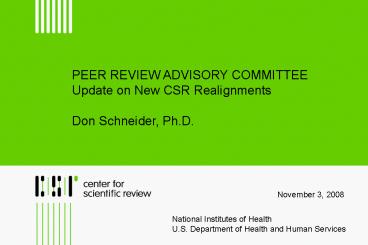CSR Realignment Schneider 11032008 - PowerPoint PPT Presentation
1 / 12
Title:
CSR Realignment Schneider 11032008
Description:
Gene Therapy and Inborn Errors Special Emphasis Panel - started in 2003 ... Henderson, NIBIB; Jeff Schloss, NHGRI; Bert Shapiro, NIGMS; Noni Byrnes, CSR; ... – PowerPoint PPT presentation
Number of Views:42
Avg rating:3.0/5.0
Title: CSR Realignment Schneider 11032008
1
PEER REVIEW ADVISORY COMMITTEE Update on New CSR
Realignments Don Schneider, Ph.D.
November 3, 2008
National Institutes of HealthU.S. Department of
Health and Human Services
2
Reality checks are sometimes necessary
- Gene Therapy and Inborn Errors Special Emphasis
Panel - started in 2003 - Nuclear Dynamics and Transport - chartered in
2005 - Current NIH Enhancing Peer Review efforts
implications for study section organization
3
Gene Transfer and Inborn Errors survived planned
closing
- Created as interim review home for inborn errors
applications - Reorganization completed 2005
- In 2008, GTIE reviewed 30-35 applications a cycle
- Rule of thumb, after one year, special emphasis
panel should be chartered or discontinued
4
GTIE Working Group met August 18, 2008
- ROSTER
- Gerard Berry, Childrens Hospital, Boston
- Katherine High, Childrens Hospital, Philadelphia
- Mark Kay, Stanford U
- Blake Roessler, U Michigan
- Mendel Tuchman, Childrens Nat Med Ctr
- Stephen Warren, Emory U
- NIH Rebecca Link, NHLBI Catherine McKeon,
NIDDK Richard Panniers, CSR Don Schneider, CSR
5
Working Group strongly favors chartering
- Broaden guidelines
- Molecular mechanisms of genetic diseases
- Development of genetic disease therapies
- Preclinical and initial clinical studies of
genetic disease therapies - Shared interests
- Gene Drug Delivery (basic)
- Genetics of Health Disease (complex genetics)
- Broaden name
- Genetic Disease Mechanisms and Therapies (GDMT)
6
Cell Biology study sections have grown slowly
- Nuclear Dynamics Transport (NDT) 40-45
applications/cycle - Cell Structure Function (CSF) 60
applications/cycle - Cellular Signaling Regulatory Systems (CSRS) 65
applications/cycle
7
Cell Biology-Nanotechnology Working Group met
September 18, 2008
- ROSTER
- Ashutosh Chilkoti, Duke U
- Joseph Gall, Carnegie Inst
- Ian Macara, U Virginia
- Paul Matsudaira, MIT
- Timothy Mitchison, Harvard Med
- Michele Pagano, New York U
- Peter Rubenstein, U Iowa
- Pamela Silver, Dana Farber
- NIH Ravi Basavappa, NIGMS Lori Henderson,
NIBIB Jeff Schloss, NHGRI Bert Shapiro, NIGMS
Noni Byrnes, CSR George Chacko, CSR Don
Schneider, CSR
8
Working Group agreed to disband NDT
- Reassign applications and members to existing
study sections - Cell cycle regulation, mitosis, and checkpoints
to CSRS - Nuclear membrane, matrix, and architecture, pore
development and function, nucleo-cytoplasmic
transport to CSF, fit well with cytoskeleton,
trafficking, and multiprotein assemblies - CSRS CSF increase to 70-80 applications/cycle
- Rename CSF Nuclear Cytoplasmic
Structure/Function Dynamics (NCSD)
9
Working Group considered Nanotechnology
- Nanotechnology (NANO) study section diverse,
more than 100 applications/cycle - Applied Nanotechnology (NANA) appropriate for
cell biology, with basic applications remaining
in NANO - Complications number trend unclear,
bioengineers not comfortable (including James
Baker, U Michigan) - Cell Biology does have a handful of
technology-driven applications every cycle
10
NIH Enhancing Peer Review will drive study
section changes
- Likely changes
- Shorter applications, 12 page R01
- Shorter written critiques, 1-2 pages
- Likely result on study sections
- Enhanced quality of review outcomes
- Enhanced efficiency of review process
- If 20 gain in efficiency, ideal workload may
shift from 60-80 to 80-100 applications/study
section - This may not be a good time to charter small
study sections.
11
PRAC approval soughtto finalize realignments
- Gene Therapy Inborn Errors
- Expand as Genetic Disease Mechanisms and
Therapies (GDMT)? - Charter, or special emphasis panel for now?
- Nuclear Transport Dynamics
- Split between Cell Structure Function (CSF) and
Cellular Signaling Regulatory Systems (CSRS)? - Rename CSF as Nuclear Cytoplasmic
Structure/Function Dynamics (NCSD)? - Nanotechnology (NANO)
- With divided opinions and number decline,
postpone splitting for now? - Meanwhile, for technology-driven R01s in Cell
Biology, run special emphasis panel?
12
The End































